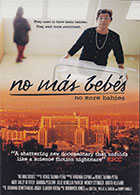
No Más Bebés 2015
Distributed by Good Docs
Producer n/a
Directed by Renee Tajima-Peña
DVD, color, 79 min., Spanish and English with subtitles
High School - General Adult
Anthropology, Birth Control, Civil Rights, Ethics, Hispanic Americans, Latinos (United States), Reproductive Rights
Date Entered: 03/02/2016
Reviewed by Linda Frederiksen, Washington State University, Vancouver, WAIn 1968, a Stanford University biologist named Paul Ehrlich published The Population Bomb. The highly influential book predicted global food shortages based on overpopulation. Among the book’s many suggestions to control population: expanded abortion, better contraceptives, and mass sterilization. How widespread doctors and other medical professionals took the last recommendation to heart, and the repercussions of their actions, is the topic of this heart-wrenching film.
When a young obstetrician joined the staff of the Los Angeles County General Hospital in the early 1970s, he found hundreds of files documenting what appeared to be a policy of systematic sterilization by physicians and University of Southern California medical students. The poor, uneducated Mexican women who came to the hospital to give birth did not understand the “informed consent” documents they were forced to sign during the final stages of labor that gave doctors permission to perform tubal ligations on the spot. In 1975, a lawsuit was brought before federal court in Los Angeles seeking reproductive justice for six of the involuntarily sterilized women. This film is the record of the young Latina women and their families, the attorneys who brought Madrigal v. Quilligan to trial, and the journalists, politicians, activists, and medical community connected to the case.
Using archival footage from the time period and the words and faces of the women who were forcibly sterilized, the filmmaker places highly personal stories within the context of the larger civil and women’s rights movements of the 1970s. Fast-paced and well-produced, the film is a devastating reminder of the consequences of being young, poor, and indigent.